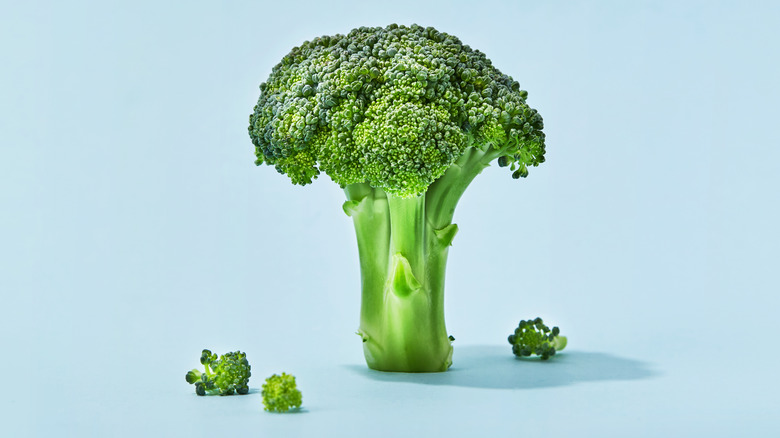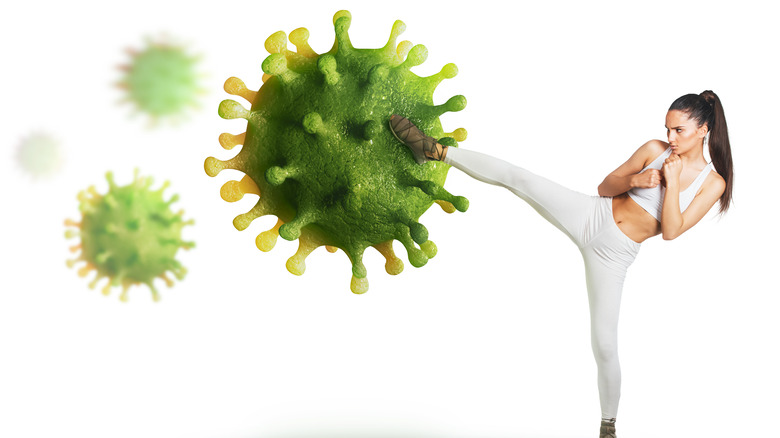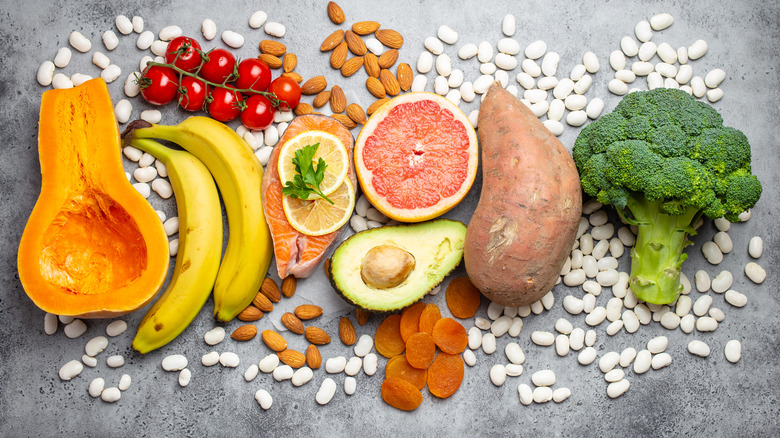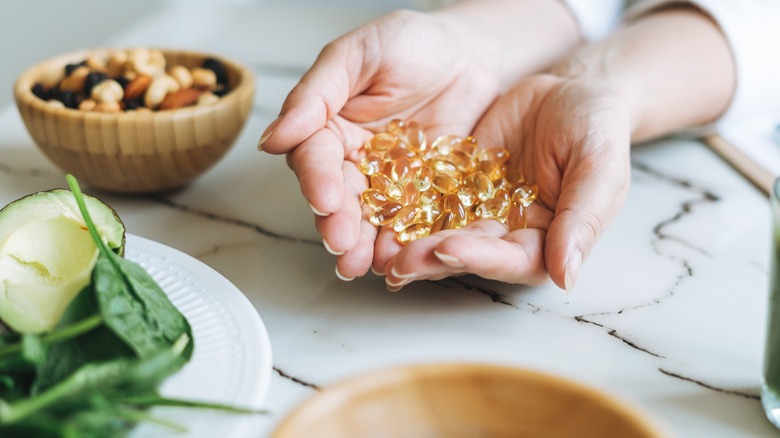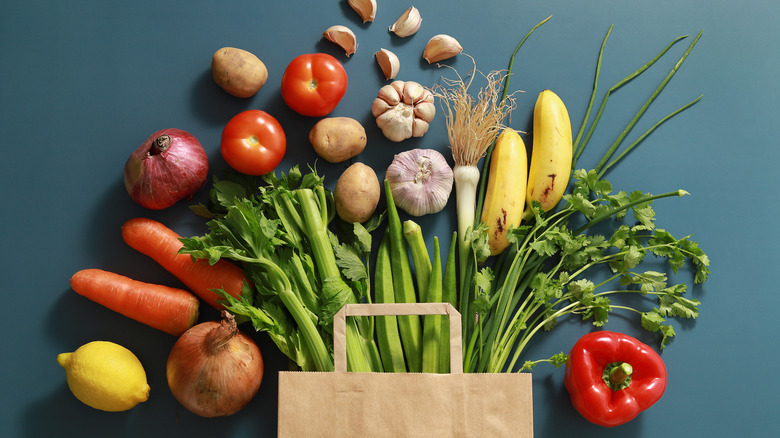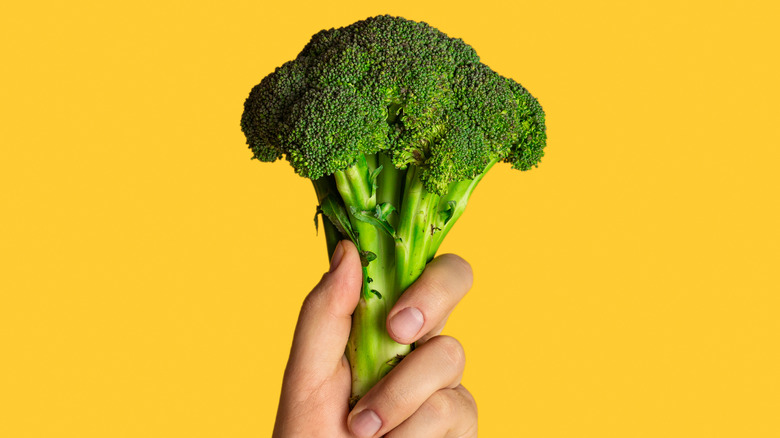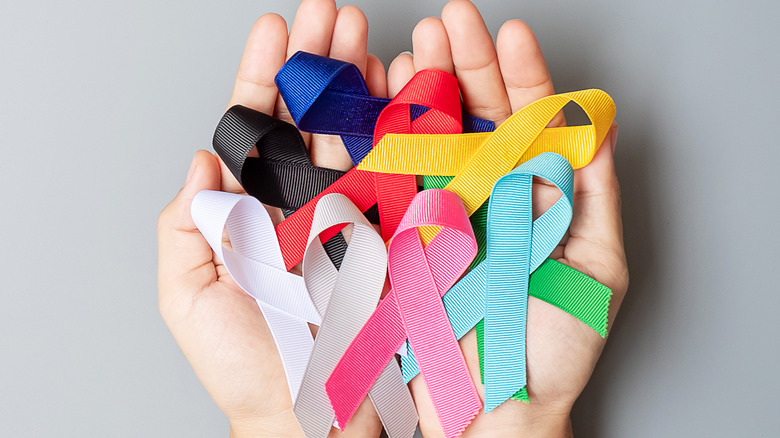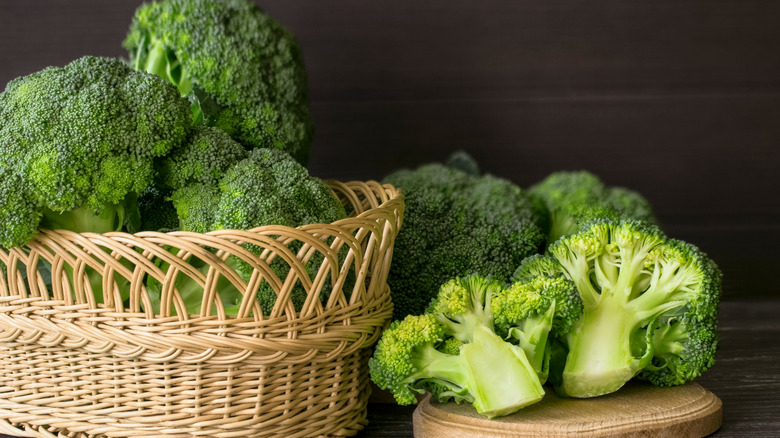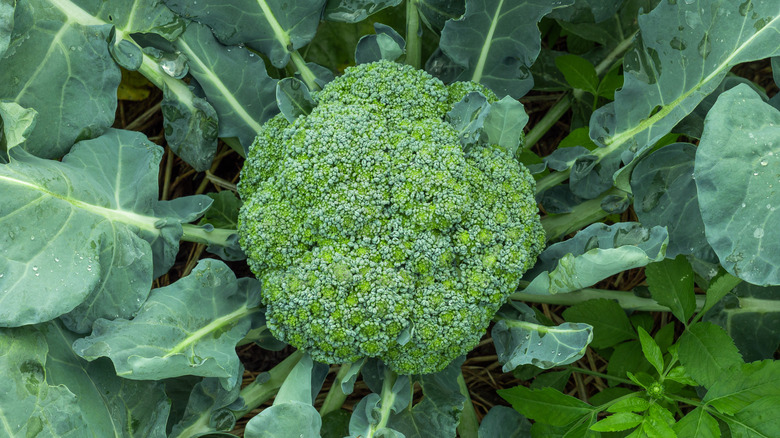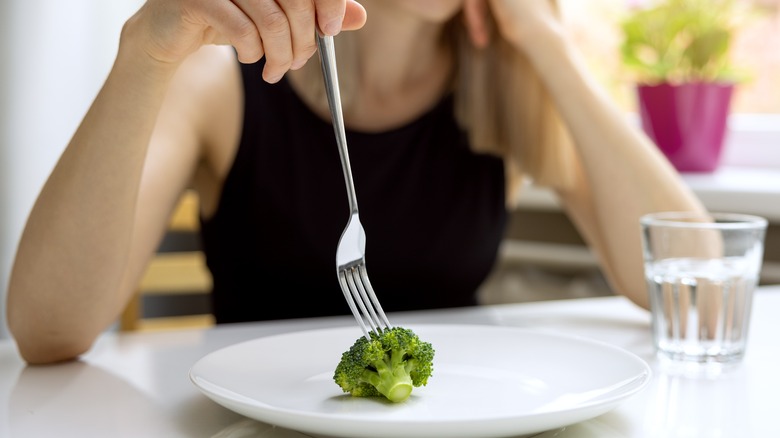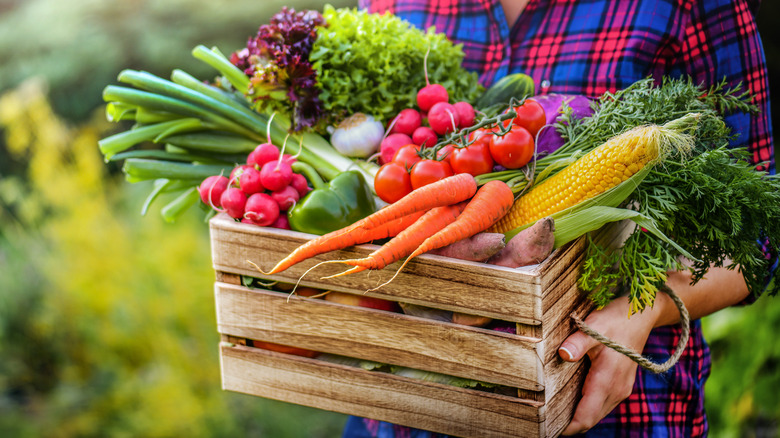What Happens To Your Body When You Eat Broccoli Every Day
Broccoli has a reputation for being, like, ridiculously healthy (and you probably already knew that). Whether you love munching on these mini-trees prepared in various ways or merely scarf them down because of their alleged health benefits, broccoli is pretty popular fare for health-conscious eaters. Broccoli also seems to be one of the veggies that kids detest, but adults know is totally palatable, if not downright delicious (when covered in the right amount of butter and salt, of course).
When it comes to food, we all know that we are supposed to eat green things because of their health benefits. But what exactly are broccoli's health benefits? Broccoli covers the bases of a healthy food, but it also goes above and beyond like the over-achiever it is. What else would you expect from the cousin of Brussels sprouts, amirite?
In truth, eating broccoli every day can leave you with some pretty spectacular health effects — as well as some potential flatulence (via Healthline). Here is what you can expect if you choose to eat broccoli every day.
It may help your digestion
Why not start out by discussing the most equalizing topic of all — bowel movements?
If you begin eating broccoli every day, you are definitely going to notice some changes in your, ehem, habits. Broccoli is naturally super high in fiber, which is a compound that directly correlates to the health and functionality of your gastrointestinal tract. The combination of fiber and super shot of antioxidants is the reason why broccoli is thought to be so good at promoting bowel movement regularity (via Healthline).
In a paper published in Nutrition, research conducted on mice has shown evidence that broccoli consumption may lead not only to less inflammation in the colon, but also an increase in beneficial gut bacteria. Another study revealed that people who consume broccoli on the reg get to poop more often than those who don't (via Nutricion Hospitalaria). While there is obviously a tipping point where too much pooping becomes problematic (#problematicpooping), the propensity to avoid painful constipation is definitely enticing. According to Healthline, more research is needed to fully understand the gut implications of eating broccoli every day, but the research that has already been conducted shows awesome GI results.
Your immune system could get a good boost
We all generally know that oranges provide vitamin C, and that somehow translates to immune system support (or something like that). But did you know that broccoli also contains a whopping dose of immune-boosting vitamin C? In fact, one cup of raw broccoli contains 135% of the recommended daily intake (RDI) of the stuff (via Healthline).
Vitamin C's role in immune system support is complex and nuanced, but we can break it down like this: Consuming adequate amounts of vitamin C supports your immune system via two pathways. It supports your innate immune system, which is the bare bones, broad-spectrum immunity that you are born with. Vitamin C also supports your adaptive immune system, or the immunity that grows in response to exposure to certain pathogens. In both pathways, the vitamin C you consume helps build a strong barrier around the cells to prevent invasions by unwanted bugs. Moreover, supplementing vitamin C has been shown to prevent and even help treat certain respiratory infections (via Nutrients).
Your fiber intake will increase
Since we know that eating broccoli every day will help us poop more, it is pretty logical to assume that the stimulus for this extra bathroom time is fiber. And that assumption is, for the most part, quite correct.
A single cup of raw broccoli contains 2.4 grams of fiber, according to Healthline. Though the RDI of fiber decreases slightly as you age, for women it is recommended to consume around 25 grams per day (via Mayo Clinic). Meanwhile, men are advised to take in about 38 grams. Upping your fiber intake can pay huge dividends when it comes to your health. Some of the healthiest side effects of adequate fiber consumption include lowered levels of cholesterol, an easier time maintaining a healthy weight, assistance in blood sugar regulation, and longevity. And of course, eating enough fiber can bolster your bowel movements.
There are two types of fiber — soluble and insoluble. Both of these are beneficial to munch on. Soluble fiber dissolves in water quite easily, while insoluble fiber does not. Consuming a wide variety of fruits, veggies, legumes, and grains is a great way to ensure that you are getting enough of both kinds.
You'll get a good amount of potassium
When you think of potassium, chances are that bananas are the first food source that comes to mind. It's true that a single banana contains around 422 milligrams of potassium (per Medical News Today), but that isn't the only food source that kicks ass when it comes to fulfilling the body's desire for this mineral. One cup of broccoli delivers 460 milligrams of potassium, which is nearly 40 milligrams more than what you'd get from a banana (per University of Michigan Health).
Potassium is a super important electrolyte that helps perform some of the tiniest yet most profound functions within your body (via Medline Plus). It helps your heart to beat correctly and consistently, as well as your nerves to function properly. It also plays a huge role in how well your muscles are able to contract. Even though sodium is also a necessary electrolyte, too much sodium can create health problems. In some cases, potassium has been shown to combat the negative effects of too much sodium.
Your vitamin intake will increase
One of the best things about broccoli is that it is super healthy while also being pretty delicious. If you choose to eat broccoli every day, you are likely to up your vitamin intake by, well, a lot. Beyond just the vitamin C to support your immune system, broccoli also contains vitamins B6 and B9 (folate), vitamin A, and vitamin K, all of which have an impact on your overall health.
Vitamin A is great for helping to support your vision, growth, and reproduction. It also acts like an antioxidant, and can help fight free radicals that are trying to wreak havoc on your system (via Mayo Clinic). Folate or vitamin B9 is directly linked to your metabolism and the formation of DNA and RNA. The effect it has on the creation of these biological codes is part of why it is so important for pregnant women to consume (via the Harvard School of Public Health).
Meanwhile, the main functions of vitamin B6 are linked to immune function, nerve function, and brain development, according to the Mayo Clinic. Finally, vitamin K takes a totally different route and aids in blood clotting mechanisms. Since vitamin K is not typically supplemented, consuming it by way of broccoli is a super healthy choice (via WebMD).
You'll get a healthy dose of phytochemicals
Don't feel bad if you have never given any thought to the amount of phytochemicals you are consuming. You are definitely in the majority if a passing thought about phytochemicals has never even entered your mind.
Phytochemicals are compounds that occur naturally in fruits and vegetables and are incredibly beneficial to consume. Phytochemicals have been shown to help decrease incidences of cancer, heart disease, and more (via Science Direct). For example, one specific type of phytochemicals, phytosterols, can be found in many fruits, veggies, nuts, and seeds. Phytosterols have been shown to suppress the growth of tumor cells. Limonoids, which are found mainly in citrus fruits, are known to play a massive role in the body's cellular detoxification process.
A few different types of phytochemicals even act as antioxidants within the body. These compounds can help protect against the carcinogenic effects of free radicals and inflammation.
Your antioxidant intake will increase
Phytochemicals and antioxidants are different compounds, but phytochemicals can act as antioxidants, which is definitely a beneficial side effect of consuming them.
That said, antioxidants are technically less of an actual substance and more of a way of describing how different substances can interact with your natural biology. There are thousands of different antioxidants, and their common thread is how they fight free radicals within our bodies (via Medical News Today). However, antioxidants all serve slightly different functions, which is why it is essential to consume them via a variety of food sources (and not just from broccoli).
If you choose to up your broccoli intake and make it a daily occurrence, your intake of antioxidants will also increase. There are a few specific compounds in broccoli that can help reduce oxidative stress on your body. Oxidative stress is caused by free radicals and can lead to inflammation and other serious health issues (via Live Science).
It can help reduce your cancer risk
Cancer is one of those things that we are all at risk of getting, as unfortunate as that is. While we all collectively have high hopes that a cure for cancer will be discovered, that cure has not yet been found. Because of this, many of us try to reduce our risk of cancer through our daily habits. A new habit that you may want to include if you want to decrease your cancer risk is daily broccoli-chomping.
Free radicals are molecules that are super reactive, and may bring about cellular damage that leads to cancer about as quickly as you can spell "chemo-radiation." Many of the compounds in broccoli — most of which are antioxidants — can help fight the negative effects that free radicals have on the cells and neutralize the harm they do, resulting in a healthier body overall (via Cancer). Moreover, these same compounds may influence estrogen levels in a way that reduces some people's risk of breast cancer (per Live Science).
Eating broccoli every day might help regulate your blood glucose
While there is still a ton of research to be done on this topic, the available findings strongly show a link between broccoli consumption and blood glucose regulation, especially in cases of diabetes. Specifically, broccoli contains a compound called sulforaphane, a phytochemical that can also be found in abundance in other cruciferous vegetables (via MD Anderson Cancer Center).
In one study cited by Live Science, obese participants were given a concentrated form of sulforaphane and closely monitored. The results showed that this compound helped the patients regulate their blood glucose, which significantly helps in warding off diseases that can be exacerbated by blood sugar irregularities. However, the broccoli sprout did not have the same effect on non-obese study participants. In people whose blood sugar was influenced, it lowered fasting blood sugar by around 10% more than those who consumed a placebo.
When compared to metformin, the leading drug that helps with blood sugar regulation in people with diabetes, sulforaphane has fewer negative side effects and is better tolerated by many people. Research is currently underway to enable experts to further understand how sulforaphane can help people who have prediabetes (via Live Science).
Symptoms of autism may decrease
Sulforaphane, the same compound that has been shown to regulate blood glucose, may also play a significant role in decreasing autism symptoms.
A 2014 study published in the Proceedings of the National Academy of Sciences suggests that regularly ingesting sulforaphane in the form of broccoli extract can help alleviate some of the symptoms of autism. Researchers have been very clear about the need for more rigorous studies on this topic, but the exhibited improvement of some symptoms is nonetheless promising (via Live Science). While the link between autism and sulforaphane has not yet been concretely established, researchers think it might have something to do with the way this compound can combat oxidative stress within the body of someone who has autism.
Admittedly, it is difficult to consume enough sulforaphane to meet the threshold to ignite these changes. Even if you are able to consume enough broccoli to meet the sulforaphane threshold, the amount in each varietal of broccoli differs, making it a less-than-precise dietary compound to measure. A person's capacity to convert the compound into usable sulforaphane within their body varies as well, as some people's bodies do this more readily than others.
Eating broccoli every day can positively affect your cholesterol
Cholesterol has a pretty bad reputation in general. That said, there are two types of cholesterol: low-density lipoprotein or LDL, which is said to live up to its aforementioned reputation, and high-density lipoprotein or HDL, which helps keep the arteries unclogged and may even reduce a person's risk of certain diseases (via the Cleveland Clinic).
HDL, or the so-called "good" cholesterol, can help you digest dietary fats through a complex systemic reaction, which aids in your ability to healthily process the fats you consume. Simply put, when carried out with broccoli in your system, this reaction can help you lower your levels of "bad" cholesterol. This effect is being studied to confirm its link to a reduction in cancer and heart disease rates (via Healthline). "Bad" cholesterol, especially when left unchecked, is a major factor that contributes to heart disease.
Lastly, steamed broccoli has been shown to influence our bile production and positivity affect our cholesterol levels, according to a study published in Nutrition Research.
If you take certain medications, you'll need to be careful
A type of medication that can interact poorly with some of the vitamins in broccoli is called warfarin. Working as a blood thinner, warfarin is said to help prevent blood clotting, and is often prescribed to people who have heartbeat irregularities, have had heart attacks, or have other blood- and heart-related issues (via Medline Plus).
Vitamin K has been known to not play well with warfarin, which is something to keep in mind if you want to incorporate broccoli into your daily diet (via Nutrition Review). Broccoli contains vitamin K, so be wary of having too much of it. A 3-cup serving of dark leafy greens, included broccoli, contains between 100 and 570 micrograms of vitamin K. This does not seem to be enough to interact badly with warfarin. However, if your vitamin K intake climbs up to 700-1500 micrograms, you are likely putting yourself at elevated risk.
In general, dark leafy greens are still very healthy in moderation, but over-consuming them in tandem with warfarin might have disastrous effects on your health.
Too much broccoli might negatively affect your thyroid
It might seem illogical to learn that even vegetables can lead to negative health repercussions. After all, vegetables are supposed to be the healthiest foods around, right? Yes... but as with most things, moderation is the key to success.
Healthline explains that an over-consumption of leafy greens often occurs when you are adding a lot of them to smoothies and juices. These greens, while super healthy, contain compounds called thiocyanates. Thiocyanates can get in the way of your body's absorption of iodine, which can negatively affect the health of your thyroid. Specifically, it can lead to hypothyroidism, which is characterized by an enlarged thyroid, weight gain, dry skin, fatigue, and constipation.
You are at an elevated risk of complications because of an over-abundance of leafy greens if you are already predisposed to thyroid issues. That said, keeping things in moderation should be fine (via Healthline).
You might get super gassy
If you have ever over-eaten broccoli (as many of us are wont to do when it is smothered in cheese), you know that it can occasionally lead to gas and digestive issues.
Broccoli contains two compounds that, when combined, can lead to unpleasant gaseous conditions in your gastrointestinal tract. First, broccoli contains a lot of fiber, which creates a feeding frenzy for bacteria upon its arrival in the colon. Secondly, broccoli contains raffinose, a specific trisaccharide carbohydrate that the human body is not equipped to digest. Humans lack the enzyme needed to break raffinose down correctly, which leads to ... you guessed it, gas (via Livestrong).
So in essence, it is not the broccoli that is giving you gas; it is the body's inadequacy when it comes to processing broccoli that is to blame. To prevent becoming gassy the next time you're munching on some broccoli, cook it well to ease some of the effort of digestion. Livestrong also recommends taking Gas-X or Beano to help quell the Coca-Cola-like sensation in your stomach.

